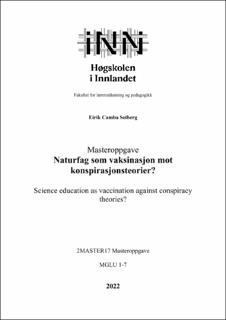| dc.description.abstract | Formålet med denne masteroppgaven er å finne ut hva lærere i naturfag tenker om konspirasjonsteorier i klasserommet. Mer spesifikt skal oppgaven forsøke å besvare to forskningsspørsmål. Det første handler om hvilke aspekter ved kritisk tenkning og vitenskapelige tenkemåter lærerne fremhever som viktige i denne konteksten. Det andre dreier seg om hvilken rolle lærerne beskriver de har i å yte motstand mot konspirasjonsteorier. For å belyse dette er to lærere på barnetrinnet intervjuet om tematikken. Datamaterialet fra dette intervjuet er deretter analysert ved å anvende et rammeverk for vitenskapelige tenkemåter utviklet av Manassero-Mas og Angel-Vasquez (2019), samt et rammeverk for å belyse lærernes rolle i uttalelsene deres. Dette har sitt teoretiske fundament i teorien til Aikenhead (1996) om elevers varierende vanskeligheter i grensekryssing mellom subkulturer, Borgerding (2017) sin beskrivelse av læreren som en kulturell turguide i kontroversielle temaer i naturfag og Taber (2017) sin utvidelse av dette begrepet til å være relevant i alle temaer i naturfag og problematisering av tro som en relevant faktor i naturfag. Analysen blir drøftet særlig i lys av en beskrivelse av former for motstand mot konspirasjonsteorier utarbeidet av sosialpsykologen og statsviteren Peter Krekó (2020).
Resultatene viser at lærerne særlig trekker frem to aspekter ved vitenskapelige tenkemåter som viktige i møtet med konspirasjonsteorier. Disse er koordinering av forklaring og bevis, og holdninger og verdier. Begge disse aspektene og de dimensjonene ved kritisk tenkning som korresponderer med disse er viktige i de to formene for motstand som er relevante i skolen: vaksinasjonsstrategien og helbredelsesstrategien. Begge lærerne beskriver sin rolle som to forskjellige avhengig av hvilken av disse strategiene de omtaler. I vaksinsasjonsstrategien beskriver de seg selv som en guide til naturfag, sikre på at elevene vil komme til naturfaglig gode konklusjoner til konspirasjonsteorier hvis de bare blir vist og trent i å anvende naturfaglige verktøy som praksiser og tenkemåter. Men hvis elevene viser seg å ikke komme til en slik konklusjon, skifter de rolle vekk fra den nøytrale guiden, til en mer overtalende rolle som fokuserer mer på at eleven skal tro på det han sier enn å benytte naturfaglige verktøy til å komme til sin egen konklusjon. | |
| dc.description.abstract | The purpose of this thesis is to discover the attitudes of science teachers towards conspiracy theories in the classroom. More specifically, this thesis will attempt to answer two research questions: Which aspects of critical thinking and scientific method do the teachers consider most important in this context? And: Which role do the teachers adopt when countering conspiracy theories? Two teachers from primary school have been interviewed in light of this topic. The data from this interview has then been analyzed using a framework for scientific thinking developed by Manassero-Mas and Angel-Vasquez (2019), as well as a framework investigating the teachers’ role in their responses. This is based on the theories of Aikenhead (1996) on the varying degrees of difficulty students have when crossing borders between subcultures, the description from Borgerding (2017) of the teacher as a cultural tour guide in controversial topics in science education, and Taber’s (2017) extended use of this concept as relevant to all topics in science education as well as a discussion of belief as a relevant factor in science education. The analysis is particularly discussed in light of a description of various types of resistance to conspiracy theories developed by the social psychologist and political scientist Peter Krekó (2020).
The results show that the teachers emphasize two aspects of scientific thinking as important in particular when countering conspiracy theories. These are on the one hand coordinating explanations and evidence, and on the other hand attitudes and values. Both of these aspects, as well as the dimensions of critical thinking corresponding to them, are important in the two types of countering strategies relevant in teaching: vaccination and healing. Both teachers describe their role as different depending on which strategy they are speaking of. When using the vaccination strategy, they describe themselves as a guide to science education, confident that their students will reach scientifically solid conclusions regarding conspiracy theories, provided that they are taught and trained to use scientific tools in their practice and thinking. However, if the students do not reach such a conclusion, the teachers will change roles from the neutral guide to a more persuasive role, focusing more on making the students believe what they say, rather than using scientific tools to reach their own conclusions. | |
